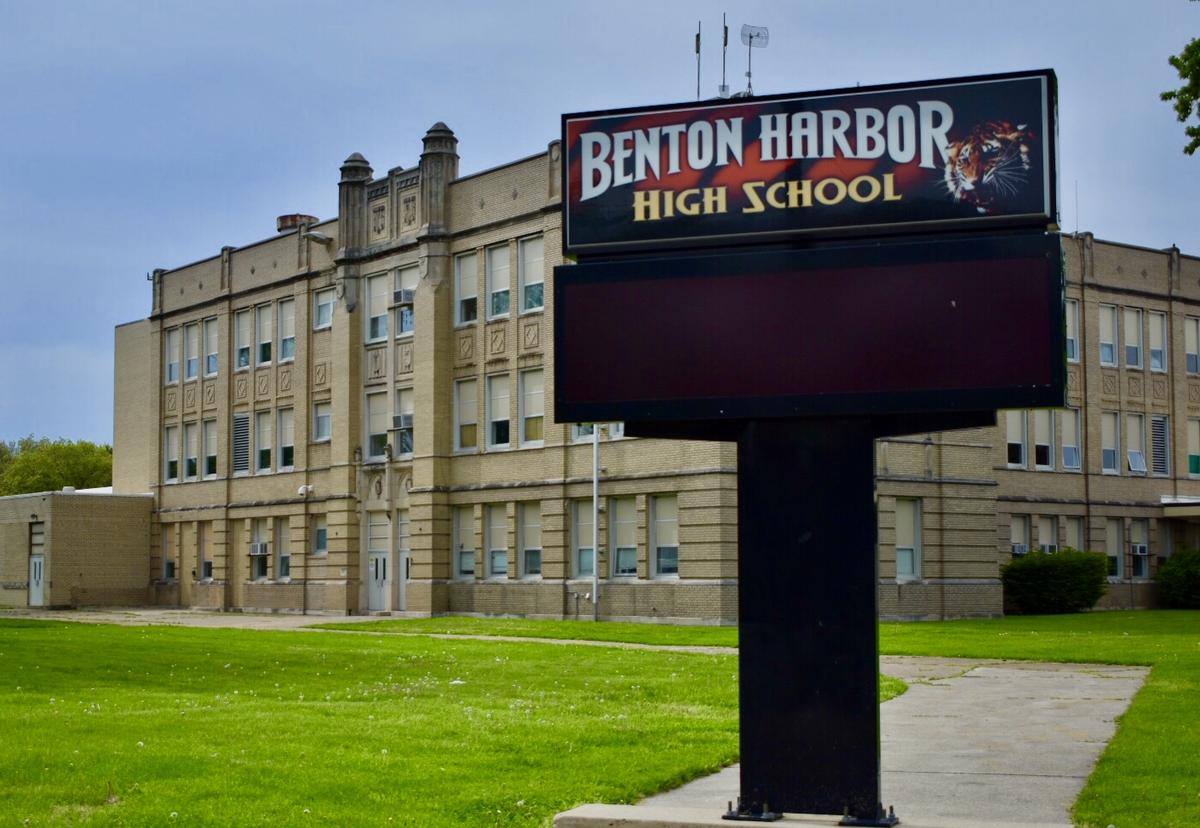
Benton Harbor High School
ACLU/MI brings pressure to bear on Gov. Whitmer’s administration in letter Aug. 2: stresses disastrous history of state intervention, corporate land grab
BH School Board Vice-President Joseph Taylor: Developers want choice BHHS land (hear interview with WVPE reporter Jennifer Weingart below)
https://www.wvpe.org/post/conversation-benton-harbor-school-board-vice-president-joseph-taylor
BHAS submits new proposed plan for district to Whitmer
State AG Dana Nessel says Gov. Whitmer has no authority to close Benton Harbor schools
BENTON HARBOR–In the wake of Michigan Governor Gretchen Whitmer’s announcement of plans to close all of part of the Benton Harbor School District, the Michigan Chapter of the American Civil Liberties Union has weighed in strongly, calling for self-determination for the students and residents of this beleaguered Black-majority city.
Atty. Mark Fancher of the ACLU’s Racial Justice Project sent Whitmer a letter Aug. 2. See full letter at http://voiceofdetroit.net/wp-content/uploads/Letter-to-Governor-Regarding-Benton-Harbor-High-School.pdf.
ACLU LETTER TO WHITMER:

ACLU Atty. Mark Fancher in a 2011 photo by VOD.
In the ACLU letter, Atty. Fancher writes in part, “In recent weeks we have spoken with Benton Harbor residents and activists with whom we have had both long-term and recent acquaintance. Based on those discussions as well as our overall experience with education issues and previous administrations’ use of emergency managers, we strongly urge against any inclination to revive the idea of unilaterally closing the high school, or to resort to state control of the school district in some other form.
“Benton Harbor High School was established in 1872, and it has not only played a central role in the lives of many generations of Benton Harbor residents, it is in a real sense an anchor of the community. Closing the school would eliminate one of the only remaining educational, cultural and civic centers in a community that has endured decades of discrimination, marginalization and poverty. As for emergency management, the City of Benton Harbor’s experience with the emergency manager approach during previous administrations was one that denied the people of that city their democratic rights and democratic participation in government, regardless of one’s opinion about whether it was effective. The school system should not be subjected to the same experience.”
Fancher notes that 85 percent of Benton Harbor’s population is Black, and that it has a poverty rate of 48 percent, in the wake of “deindustrialization, white flight, rising crime rates, the crack trade, chronic unemployment, and loss of state revenue-sharing.”

Slavemaster Former Michigan Governor Rick Snyder disenfranchised over half of the state’s Black population. A popular vote repealing his first Emergency Manager law was disregarded and replaced with the bulletproof PA 436.Meanwhile, the country’s largest Black majority city, Detroit, and other Black majority cities in Michigan have been stripped of virtually every asset.
He continues, “In recent years, the state’s purported efforts to address Benton Harbor’s challenges through emergency management have not only failed, they have made matters worse because they were part of a pattern of state actions that were racially discriminatory. In a case challenging the constitutionality of the emergency manager laws, U.S. District Judge George Caram Steeh noted: ‘By plaintiffs’ calculations, over 52% of Michigan’s African Americans are under emergency manager authority pursuant to the enactment of [the emergency manager law], compared to two percent of Michigan’s Caucasian citizens.'”
Steeh said also that six out of seven communities of color (85%) were taken over by emergency managers because the state scored them at fiscal alert rates of 7, while no communities with a majority-white population and fiscal alert rates of 7 were taken over.
“By 2011 the school district was $18 million in debt,” Fancher continued. “The state issued an ultimatum demanding that school officials cut $2.6 million from its budget or have an emergency manager appointed to run the district.”
He said the district later agreed to a state-approved debt elimination plan, but its economic troubles continued, causing it to go further into debt. The debt was down to $15 million by 2014, out of a total $40 million budget. The district consolidated 40 percent of its buildings, privatized non-instructional services, and enacted 10 percent pay cuts for the rest of the staff.
Subsequently, Fancher writes, Gov. Rick Snyder appointed a district “CEO,” Robert Herrera, who reported directly to the state school reform board, not the district’s board. He resigned in June.
[VOD: During Herrera’s tenure, the district’s debt rose back again to $18 million; however the operating deficit last year was just $4.8 million. But the district is expected to pay the principal on $11 million in state loans which the state no longer backs, in 2020, according to a report from the Michigan Citizens Research Council. at https://crcmich.org/whats-next-for-the-financial-crisis-in-benton-harbor-schools/
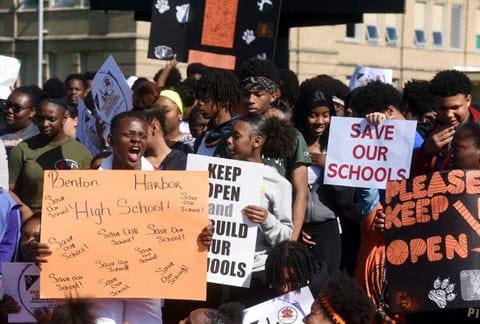
Benton Harbor High School students rally to save their school district in June, 2019.
Fancher says the position of the state ACLU is that the people of Benton Harbor have the right to evaluate their school board at the ballot box, and that attacks on school leaders can obscure the real causes of a district’s problems.
“Research by Michigan State University Professor David Arsen demonstrates that a school district’s financial distress may be due to race and factors unrelated to school management,” Fancher notes. He says Arsen found in 2015 that 10 percent of the state’s 550 districts had operating deficits in the years 2012 to 2014, but that emergency managers were assigned primarily to predominantly African-American districts, including the state’s largest district, in Detroit.
“Arsen sought, and found, an explanation for this racial phenomenon. He concluded that predominantly Black school districts find themselves having to do far more with fewer resources, not because they are Black, but because of the dynamic triggered by the presence of charter schools in the district. High achieving students in search of better educational opportunities leave the district’s schools for charter schools and leave behind students who need much more expensive special education services:
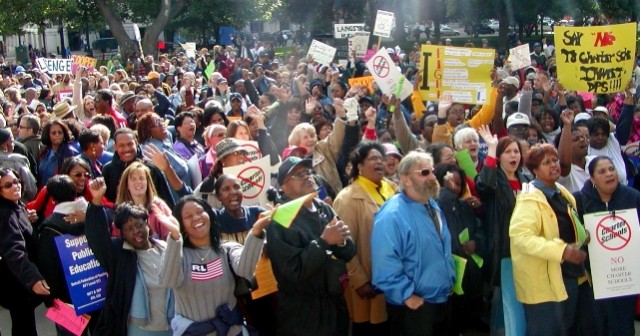
Detroit Public Schools teachers walked out across the district in 2001 to rally in Lansing against bill that would have opened the way to more charter schools. They succeeded for the time being. But now the majority of Detroit students attend for-profit charter schools with limited curriculums and accountability.
“Districts with high concentrations of African American students are much more likely to be subject to intense charter school penetration, to lose students to inter-district choice, and to have higher concentrations of students with disabilities.”
He continued, “We also want to lift up concerns in the community about having Benton Harbor High School students attend schools in neighboring districts. Racial integration has many potential benefits, but it cannot occur successfully without proper preparation of the communities that will be affected. This would require the engagement of skilled professionals working in Benton Harbor and neighboring communities over an extended period of time. The resources that would be required for such an undertaking would be better spent on improvement of Benton Harbor’s own high school.
(VOD note: According to the report from the Michigan Citizens Research Council, 65 percent of Benton Harbor students attend school in other districts already.)
ACLU Decries Corporate Land Grab behind Whitmer plan
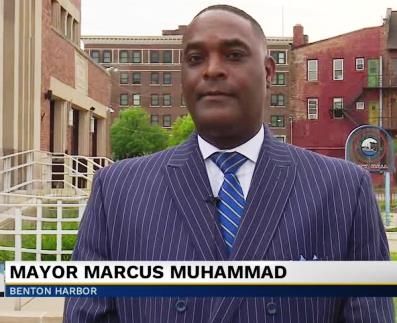
Benton Harbor Mayor Marcus Muhammad, elected in 2016.
He quotes Benton Harbor Mayor Marcus Muhammad who said that he believes the state’s motive is to seize the prime property near the St. Joseph River where Benton Harbor High School is located. Muhammad noted he has seen development plans with no high school building on the site.
“Follow the money and money talks,” he said. “They say it’s about finances. But what’s not said in the undercurrent is there is elaborate plans to turn Benton Harbor into a tourist attraction for second homes and retirement and recreation. Basically, a new population and push out those who have stayed in the city.”

Rev. Edward Pinkney speaks at rally in Benton Harbor in 2012: Jean Klock Park is not for sale!
Fancher continues, “The ACLU has heard this viewpoint expressed not only by individuals engaged in civic affairs but also by everyday Benton Harbor residents. The fears are based on a very real history. More than fifteen years ago, developers set their sights on seizing part of Jean Klock Park’s beachfront for development of an upscale golf resort.
“There was considerable resistance by Benton Harbor residents. Nevertheless, there has been extensive beachfront development of residential properties that are likely far beyond the reach of most Benton Harbor residents. The high school, its athletic fields and other school grounds are in the vicinity of entertainment enterprises located along Riverview Drive.”
He concludes that the residents of Benton Harbor “possess great insight regarding causes and potential solutions. If the state comes into Benton Harbor with pre-packaged guidelines, timetables and solutions, it sends the message that the people of the community cannot be trusted to determine their own destiny.”
AG NESSEL: WHITMER HAS NO LEGAL RIGHT TO CLOSE BH SCHOOLS
The Detroit News reported recently, “State Attorney General spokeswoman Kelly Rossman-McKinney told The Detroit News the governor has no legal authority to ‘force’the Benton Harbor school board to accept her proposal to educate only students in grades K-8 and send all high school students to neighboring districts.
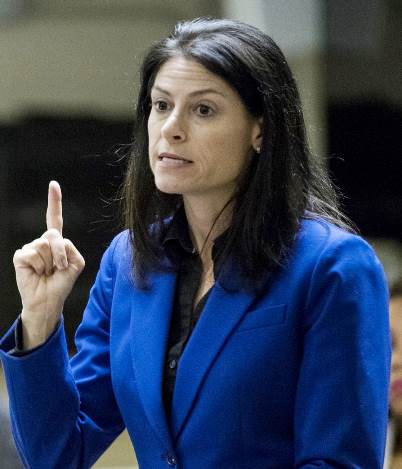
State AG Dana Nessel
“The governor’s proposal was an attempt to avoid the Treasurer and (Michigan Department of Education) from taking more severe and drastic statutory action against BHAS such as dissolving the BHAS school district … or having the Superintendent of Public Instruction conduct a preliminary review to determine the existence of probable financial stress,” Rossman-McKinney said in an email.
Asked to cite the governor’s authority to close the high school, Tiffany Brown, spokeswoman for Whitmer, said the state “offered a proposal” for the district to consider and the governor agrees with state law that the state superintendent of public instruction and the state treasurer are the only two authorities who can dissolve a district.
Brown said action by state lawmakers would be needed if dissolution is sought because Benton Harbor does not meet all of the criteria outlined in the law to dissolve the district. Specifically, the district did not lose at least 10% of students between the 2017-18 and the 2018-19 school years, Brown said.”
BENTON HARBOR AREA SCHOOL DISTRICT SUBMITS NEW PLAN TO GOV.

Benton Harbon VP Joseph Taylor also accused Gov. Whitmer of facilitating a land grab at BHHS in interview at top of story.
The beleaguered Benton Harbor School Board earlier submitted a proposed new plan to Whitmer July 20 to preserve historic Benton Harbor High School and the independence of the district.(See http://voiceofdetroit.net/wp-content/uploads/Benton-Harbor-Area-Schools-Proposed-Plan-Submitted-to-Governor-Whitmer.pdf).
At the same time, it announced plans for the opening of the new school year at Benton Harbor High School and the remainder of the district.
The proposal includes the following key issues, in part:
General Local Control and Accountability
- BHAS Board of Education will have full local control and will operate the entire BHAS K-12 school district.
- Because the threat of shutting down Benton Harbor High School has resulted in the adverse effect of parents seeking to enroll their school-aged children outside of the District, the proposed Agreement must provide that both the Board and the State are committed to keeping Benton Harbor High School open for a minimum of four years.
- The proposed Agreement must provide that if the District meets its annual benchmarks (e.g., 12-month, 24-month, 36-month, 48-month), then the four-year commitment to keep Benton Harbor High School open will continue to roll-over annually, so that students who enroll in BHAS as a freshman know that they will be able to graduate as a Tiger.
- BHAS Board will have full control over all BHAS property and buildings, including the approval of any lease or sale.
BHAS Academic and Student Performance
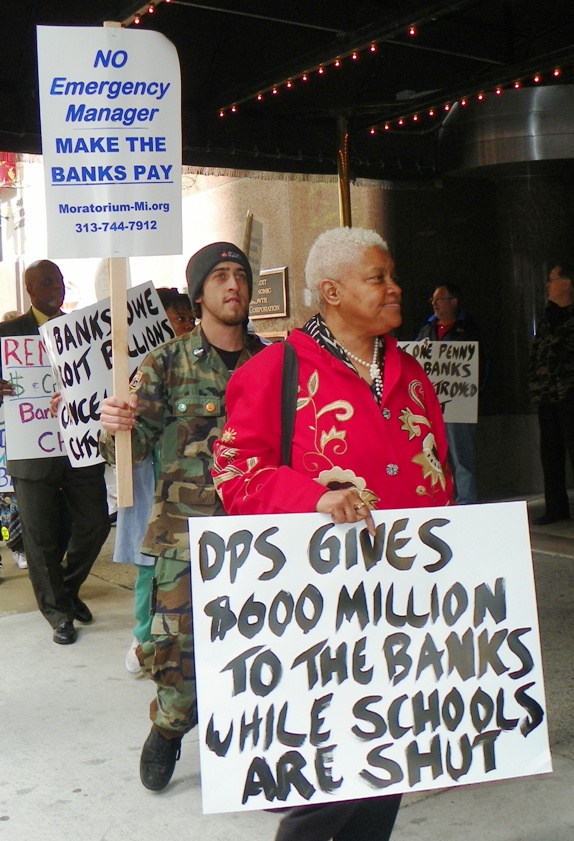
In 2012 march to stop disastrous Detroit bankruptcy proceedings, Maureen Taylor carries a sign demanding forgiveness of DPS debt. Marchers also demanded forgiveness of city debt. After Detroit bankruptcy, its debt rose by 300 percent.
BHAS will continue to implement a consistent, evidence-based curriculum across K-12, including regular and appropriate professional development for the District’s instructional staff. The costs associated with providing the professional development may be paid for by grant funding, philanthropic funding, or in-kind donations. BHAS will continue to work to increase the number of certified teachers who are hired by BHAS, especially in the areas of English Language Arts and Math.”
The board noted that such additions may be affected by a national teacher shortage, non-competitive wages, and the instability of the district.
It included a requirement that the state provide additional funding to enable BHAS to recruit and retain certified teachers.
BHAS added that it will continue to work to decrease the percentage of students who are subjected to disciplinary measures that result in the student being suspended or expelled from school, and work to decrease the percentage of students who are deemed truant. BHAS will also continue to work to resolve any outstanding special education discipline compliance issues that were remaining at the end of the 2018-19 school year, and in the future.
The BHAS also addressed fiscal issues, saying it will adopt and maintain a sound financial and operating plan for the District. This includes a balanced budget, an Enhanced Deficit Elimination Plan if required by the state treasurer, and other measures utilizing Department of Treasury recommendations.
Meanwhile a study has shown that Michigan has reduced its provision of state school funding to districts to the point where Michigan now has the lowest level of school funding in the nation.
The reduction has been caused over the years in large part by huge reductions in state corporate taxation and increases instead in funding for the state’s prison system. and more corporate tax breaks.
Benton Harbor students have also called for the state to forgive the District’s debt, largely caused by state actions under emergency managers. The state should begin by forgiving the $11 million in state loans due in 2020. The debt of Black cities and school districts across the state has been used as an excuse for state takeovers, when in fact it is encouraged by the state and the banks as a source of highly excessive interest payments.
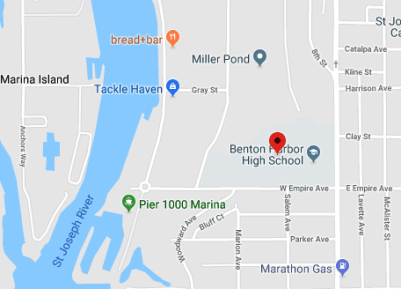
Benton Harbor High School is located in the mid-city Empire Street district off the St. Joseph RIver, currently being redeveloped by wealthy financiers.

Pier 1000 near BH High School off St. Joseph River: tourists don’t want Black students in area.
Related articles:
GOV. WHITMER WANTS TO CLOSE BLACK BENTON HARBOR SCHOOLS; STUDENTS SAY: FORGIVE DEBT, TAX THE RICH!
Various related stories from VOD (many more on school closings, Benton Harbor and Public Act 4–put these terms in search engine)
http://voiceofdetroit.net/2011/05/12/benton-harbor-blossom-time-‘recall-rick’/
______________________________________________________________
 Donations for the Voice of Detroit are urgently needed to keep this paper, which is published pro bono, going. Among ongoing expenses are quarterly Lunar Pages web host charges of $350, costs for court documents, internet fees, office supplies, gas, etc. Please, if you can:
Donations for the Voice of Detroit are urgently needed to keep this paper, which is published pro bono, going. Among ongoing expenses are quarterly Lunar Pages web host charges of $350, costs for court documents, internet fees, office supplies, gas, etc. Please, if you can:
DONATE TO VOD at
https://www.gofundme.com/VOD-readers-up
______________________________________________________________




